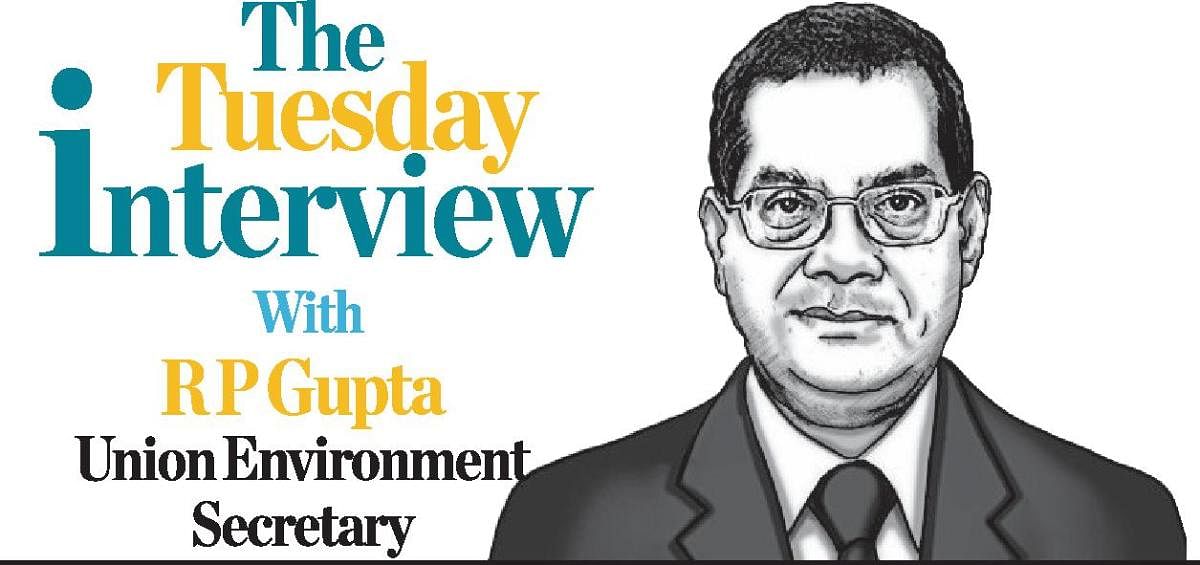
The Environment Ministry’s draft Environmental Impact Assessment norms triggered a huge controversy in the last few months, with the critics arguing that it would offer a free hand to the industry to destroy the country’s air, water and forests. The ministry was flooded with thousands of representations. In an interview with DH’s Kalyan Ray, Union Environment Secretary R P Gupta explains the rationale behind those contentious clauses. Excerpts:
Did the MoEF anticipate such a heavy barrage of protests when the draft EIA rules were released for public comments?
We did not anticipate so many protests. It is a draft notification that was published seeking comments, objections and suggestions. We frankly did not anticipate that this would lead to such a movement as if the environment has been totally destroyed.
One of the criticisms of the draft rules is that it undermines the parent law and won’t pass legal scrutiny.
There is a legal aspect and a practical aspect. We are on solid footing on the legal aspects. We are well within the provision of the Environment Protection Act, 1986, and some of the provisions in the draft are from the pronouncement of the courts, particularly the post-facto (permissions) thing which is being talked about.
The Jharkhand High Court, in a case of Hindustan Copper Ltd, stated that in cases where violation (environment clearance not taken) is involved, you can’t say such projects will be closed down. It said you must consider those cases on merit and after considering them on merit, you can either reject them or accept them. The HC said not taking environment clearance is a violation for which you must take action; but the punishment is not that you can’t consider them on merit and they have to be closed down. That any project without prior clearance would have to be necessarily closed down and can’t be considered on merit is the basic legal misconception, which is being spread around.
What are the views of the Supreme Court?
The Supreme Court in its Common Cause judgement said you can’t give ex post-facto clearance. The environmental clearance that would be given after consideration on merit is valid from the day it is given and does not condone past violations. It doesn’t have any retrospective effect. That’s what we are saying in the notification. The prior period remains a violation and for a violation punishment and actions prescribed in the law will apply.
In another SC judgement that came in February 2020 in the Alembic case, the top court overturned a NGT order to close down an industry and said it was not the correct procedure and imposed a fine. The SC said closure is not the solution and there has to be a doctrine of proportionality. They imposed the fine and the unit was re-assessed on merit.
What are the practical aspects?
Is not taking prior clearance such a big offence that a unit has to be necessarily closed down. There is a rule that every vehicle has to obtain the pollution under control certificate. Suppose you don’t obtain it and drive the vehicle. Is the solution the destruction of your vehicle? Or is it that it should be checked and if you drive it without the certificate, you pay a fine. The reactions (against the EIA) are becoming emotional rather than rational. In the case of a vehicle, it is my money or your money, but in the case of an industry, it involves public money and employment, forget the promoter’s money. Environment protection and development have to go hand in hand.
So, a violator can destroy the air, water and forests, and walk away after paying a fine?
That is not the correct perception. Suppose if an industry was set up without permission, we will examine it as a de novo case. Had it not been allowed in the first place, we will still not allow it. To say that all industries will be cleared is not correct. The violators will pay a very heavy fine just for that offence of not taking prior clearance, in accordance with the ‘polluter pays’ principle. That’s a deterrent as nobody likes to pay a heavy fine.
The SC in the 2010 Lafarge judgement asked the government to set up an independent environmental regulator. Why has that not been done in the last 10 years?
It was not considered in the last 10 years, and the government position is not to go for a regulator as of now. But this is not a closed chapter, either. At a suitable date, the regulator can come.
Why is there a distinction between violation and non-compliance?
Violation is when an industry doesn’t take the necessary prior environmental approval for establishing a unit or expanding it. Non-compliance is when the industry has taken prior approval but violates the conditions of it. The fine for non-compliance would not be as heavy as the fine for a violation. If the non-compliance is severe, we can cancel the environmental clearance.
Is the draft biased towards industry? Critics say it is meant for ‘Ease of Doing Business’.
Why do people see ‘ease of doing business’ as anti-environment? It’s a wrong perception. Environmental damage happens in each and every activity. We have to find the right balance as we can’t live without development. Industry generates employment and livelihood for people. Can we be against it? Ease
of doing business is not in any way anti-environment. I accept that our monitoring system is weak and we are now working to develop a strong monitoring system. A rigorous scrutiny spanning over five years is not a substitute for monitoring.
